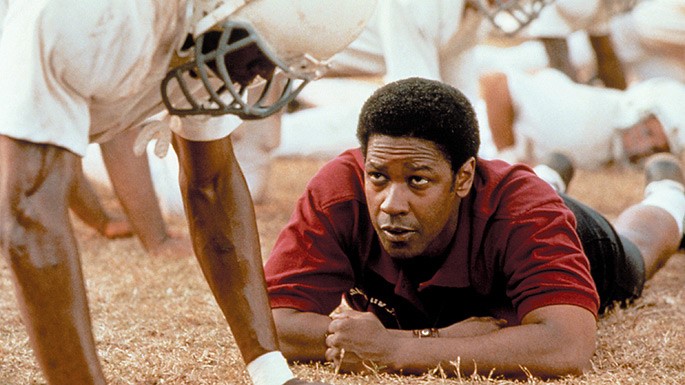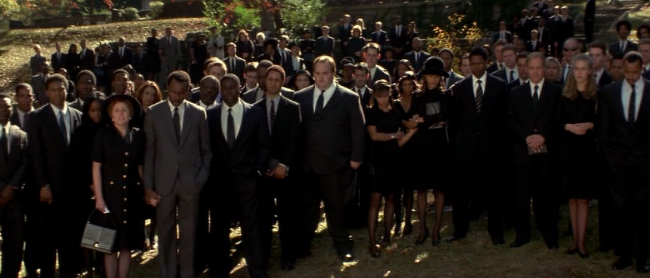In 1971, school board members stirred controversy in Alexandria, Virginia when they integrated two predominately segregated high schools into one, T.C. Williams. They also decided to name Herman Boone (Denzel Washington), an African American coach from Tennessee, the new head football coach. This move angered even more people in the community, as T.C. had been successful enough under head coach Bill Yoast (Will Patton), who himself was headed to the Virginia state high school football Hall of Fame. Yoast’s players from previous years feared their starting spots were in jeopardy with Boone coaching, especially because of his race. They also didn’t stand behind the school boards’ decision, in their opinion Bill Yoast was and would continue to be the head coach of the Titans.
This stance by the white players, as well as their refusal to play on the same team as African Americans, put Herman Boone into a very difficult situation. The black and white players refused to speak, sit on the same bus, or even make eye contact with one another. After seeing the repercussions of this in the school building and also on the field, Herman realized he needed to take immediate action.
In one of the more dramatic scenes of the film, the camera turns the corner and looks upon the scene at T.C. Williams High School on the first day of classes. Suddenly, the audience’s peaceful thoughts in the midst of the beautiful fall weather changes to fear. Hundreds of parents stand in the streets throwing household items at school buses, violently rocking back and forth signs portraying vulgar and extremely racist phrases. The only divider between the protesters and the front doors of the school is the legion of National Guard officers holding up four-foot high windowed shields. Director Boaz Yakin did a terrific job making this scene as realistic as he could have. Yakin makes the audience feel as if they were right there in 1971 watching the whole protest unfold.
Prior to the start of training camp at Gettysburg College, Boone pairs up the players one-by-one, one black teammate with one white one. At first, this led to more fighting, quarreling, and segregation on the team. Two of the biggest fighters against this coach-enforced integration were Julius Campbell (Wood Harris) and Gary Bertier (Ryan Hurst). Julius was an excellent defensive end, quick, agile, athletic, and strong. He also was very set in his ways, and played in a one-man team mindset the majority of the time. Gary, on the other hand, was a returning All-American defensive captain from Yoast’s team. He also was quick, agile, athletic, and strong, but felt challenged by Julius’s athleticism. The two butted heads constantly at the start of camp, and refused to be in the same room with one another. This led to yet another moment where Boone had to make a move, and this move changed everything.
In one of the finest moments in sports film history, Coach Boone wakes up all the players and coaches in the middle of the night and leads them on a run into the unknown dark woods around campus. This scene shows top-notch camera-work by the film crew, rhythmically cutting shots to follow the entirety of the team on the run rather than a specific few. We see teammates pushing each other on the entirety of the run, and by the time Boone stops, the entire team is winded. They look up, and in front of them is the cemetery where the Battle of Gettysburg was fought.
While the players are catching their breath, Boone says,”50,000 men died on this very field, fighting the same battle we’re still fighting in ourselves today. This green field was painted red, bubbling with the blood of young boys, smoke and hot lead pouring through their bodies.” Looking back, the next words that came out of Boone’s mouth were the turning point for the Titans, “Take a lesson from the dead; if we don’t come together, we too will be destroyed, just like they were. I don’t care if you like each other right now, but you will respect one another. And maybe, just maybe, we’ll learn how to play this game like men.”
The Titans go undefeated on the year, winning the Virginia state championship. In the movie, the Titans win 10-7 in the final seconds as backup quarterback Ronny “Sunshine” Bass provides blocks for injured starting quarterback Jerry “Rev” Harris, who runs the ball around 70 yards for the dramatic score. In real life, the Titans actually won the State Championship 27-0 over Andrew Lewis High School. The Titan’s defense was so spectacular in that game that Andrew Lewis finished the game totaling negative rushing yardage.
In Remember the Titans, Denzel Washington truly captures the power of what happened on the T.C. Williams Titans sideline in 1971. He not only gives off the feeling that he’s actually a football coach, but also really sells the points he’s trying to carry out with the team. Denzel won a BET Award for Best Actor as well as numerous others in his masterful performance.
On a different topic, one parallel I found in Remember the Titans depiction of 1971 Alexandria and 2016’s America is the divide, controversy, and hatred founded on racial tension. We’re in the midst of a national divide on the issues of race and equality, and it’s a rarity to see anything covered on the news other than racial violence, police brutality, or politicians’ controversial opinions, most of which are filled with hate and vulgarity. Turn on any major television network (CNN, Fox News, MSNBC) and there will rarely be a time you don’t see them talking about the corruption in Baltimore, Ferguson, and Charlotte.
Through watching news coverage today, and seeing the Titans interpretation of the riots in 1971 Alexandria, there doesn’t seem like much of a difference. America is in trouble once again, and in general we’re not looking for solutions, we’re continuing to feed the fire. We’re all singing “We Didn’t Start the Fire” by Billy Joel, yet we’ve got a lighter in our back pocket. So what is the solution? How do we fix the unimaginable dilemma we currently face?
We need to look back at how those who lived in the Civil Rights era turned things around. Pivotal figures such as Muhammed Ali and Martin Luther King Jr. got our nation to start talking about the issues at hand with our mouths rather than our fists (unless you count Ali’s boxing career). Now, we may not have a stage to stand on or a press conference to speak to. We may not live in Charlotte, Chicago, or Ferguson. But we can make a difference in our community, we can start healthy conversations about race and equality, and we can walk hand in hand with all races. We don’t have to necessarily agree all the time, but we need to respect one another as human beings. We can walk like Herman Boone.




 RSS Feed
RSS Feed
